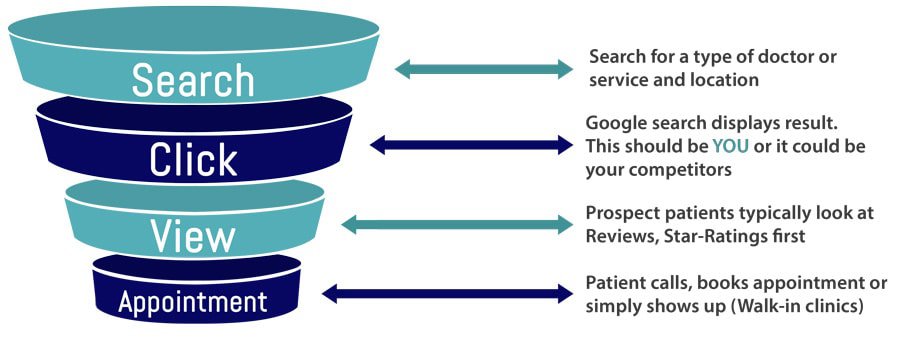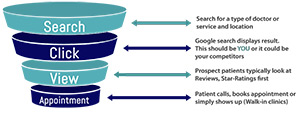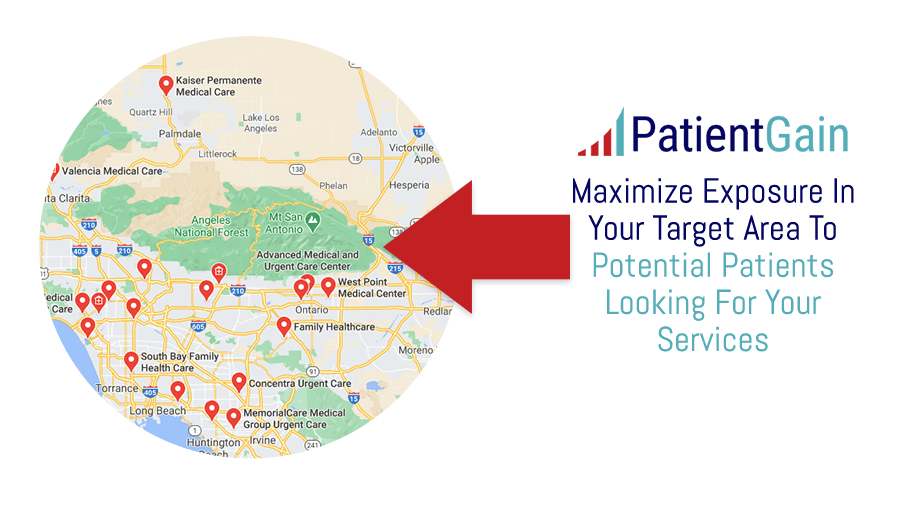Medical Advertising Using Google PPC Ads
Common Google PPC Questions and Answers asked by Doctors, Dentists and Practice Managers
Most common question: Do Google Adwords also known as PPC work for doctors and dentists?
Answer : YES! The Google PPC ads work and produce an excellent ROI for all type of healthcare practices. However, this is not a simple technology, and you cannot just “setup and forget” your advertising campaign.


How do Google Adwords work? (Also known as Google PPC)
Google Adwords are a based on bidding algorithm developed by Google in early 2000 and is being constantly updated by Google. In the world of online advertising, it is considered to be the GOLD standard. Details of the algorithms are a highly guarded secret. However, Google provides insights and guidelines for marketing and advertising professionals. Each search on google search may display “ads” in response to the search initiated by a user. There are more than 200 factors that determine the placement of the ad by the bidding algorithm, however, generally, higher the bid price, the higher the display position ranking of the Ad. Another good feature of these ads is that you (bidder = doctor, clinic, practice) only pay if a user clicks on your ads, hence the name ‘pay per click’ or PPC.

Can my competitors click on my Google PPC ads and waste my money?
Yes – This is a common problem in the world of advertising. However, Google PPC ads are one the most secure and effective ways to advertise.
For example consider these 2 examples.
Example 1 : You just hired a traditional advertising company to promote your new medical practice, let’s say an Urgent Care in Davie FL. This company has decided to display “New Urgent Care is OPEN!!! Now” and it is being displayed on all 34 regional buses in the Davie Florida area. You signed a contract of $3000/month advertising fee for a 12 month contract. Hundreds of thousands of people who ride buses are likely to see your ads. However approx 1% of the people will remember and much less than 1% will eventually use your services in the future. Some people who see your ads, will also be your competitors, or associated with your competitors. So approximately 99 % of the people who look at your ads will have no impact on your actual ROI (Return On Investment) from your medical advertising. So if you look at the whole picture, there are competitors who are looking at your ads on the buses, hence “wasting” your money. So ultimately you have to look at the ROI of medical advertising, and see how many new patients are generated and what is the actual acquisition cost of each patient.
Example 2 : You just hired a digital advertising company to promote your new medical practice, let’s say an Urgent Care in Canton MA . This company has decided to advertise on Google PPC ads for “Urgent care near me” as a keyword, among many other keywords. Your advertising budget is $3000 per month. So if your ads run 30 days a week, you will spend $100 per day. If each click costs $4 per click, that means you will get 25 clicks per day. Let’s assume one of your competitors clicks on your ads, wasting you money. If this possible? yes it is possible, but it will not last too long. Google’s PPC engine is very intelligent. It has a “profile” of everyone who clicks on your ads. So you may “waste” some dollars, but the engine will learn this misuse, and you are not charged for these clicks. Some companies estimate that 5% to 9% of your budget is wasted on these clicks. This number is up for debate. However, if you look at the ROI from Google Adwords and compared to traditional advertising, or even advertising on Facebook, Instagram etc, it can stand by itself, and produces better ROI than other mediums.
As a business owner, compare this with the example one. Where you have no control or recourse on who “looks” at your ads. So overall we have found that Google’s PPC campaigns produce very good ROI (Medical marketing Return On Investment). 98 percentage of the Google PPC campaigns we manage, produce very good, positive returns.
Will I see my ppc ads all the time?
No – It depends on your daily budget, targeted services and locations and many other dependencies.
A simple example for illustration and your understanding: A medical practice who has a budget of $3000 per month, approx $100 per day.
So if your budget is to spend $100 on ads per day – and each click costs $5 – you can potentially receive 20 “clicks” on your ads. So if you just received a “click”, the ads will pause – and the google ads engine calculates how many “clicks” are left in the entire day. If by 11 AM you have already received 15 clicks, and only 5 possible clicks are left, the google ads engine will start “throttling” your ads. Your ads will show at a less frequency as there is more time left, and less money or clicks are left for the remainder of the day.
Here are more detailed dependencies:
1. Your Own Budget
for example if your budget is $100 per day , approx $3000 per month, and if you have spend $79 for today, and it is already 11 AM , then for the rest of the day, your ads will be “throttled” and barely show.
2. Your Ads Ranking
Ad rank basically determines the position of your ad on Google page and it is determined by one’s bid for the keyword. If your clinic closing time is 5 pm and your daily budget spend at 3 PM then rest of 2 hours your ads will not pop on Google search. Next Day Your ads will show on google again.
3. Your Target Area
We target those zip codes which comes under 8 miles radius or pretty nearest to clinic location.If you Search ads outside from target locations so you can’t see the ads.
If there are excluded areas, devices, or other demographics set by your ads team, then your ads may or may not appear to you, but they will appear to actual targeted audience.
4. Your Ad Groups
An ad group contains one or more Services that share similar targets. You set a bid, to be used when an ad group’s keywords trigger an ad to appear.
for example if your budget is $100 per day then you need to advertise on your “Top Services” first – After one week of campaign live, we will go through your Campaign if campaign is not spend the budget then we will add your other services as well.
5. Your Keywords
Each Ad group has different types of keywords
For Example,
1st adgroup – Your company name (brand targeting)
within company ad group has different types of keywords- like “abc clinic near me”
2nd adgroup- city name
Your “City Name” ad group has different types of keywords – like “clinic near me in los altos”
for example if your budget is $100 per day and your keywords bid is $5.10 for City name ad group and $1.30 for My Company ad group then most of times city ad group keywords will show
6. Negative Keywords
For example, when we add “free” as a negative keyword to your campaign or ad group, we tell Google Ads not to show your ad for any search containing the term “free.”
7. Your Ad Extensions
PatientGain will typically create ads extensions in the campaign.
1. Sitelinks Extensions – Link people directly to specific pages of your website (like “direction” and “Appointment”).
2. Call Extensions – Encourage people to call your business by adding a phone number or call button to your ads.
3. Location Extensions – Encourage people to visit your clinic by showing your location.
4. Callout Extensions – Add additional text to your ad, like “Caring & Attentive Staff” or “24/7 customer support.”
All ads extensions do not appear all the time.
8. Your Ads Device Targeting
For example, If you search your ads on google from Computer and your ads show but if you search your ads from Mobile and your ads not come up, it means that most of the people searching from Mobile device and if your conversion is higher from a mobile device, then we would typically increase the bid on mobile device to show your ads on mobile. In addition, there are many other settings in the PPC engine, an advertiser can set ads to target specific devices. You can set targeted bid adjustments for tablets, mobile phones, and desktop computers.
9. When does Google charge your credit card?
You will be charged for your advertising costs 30 days after your last automatic charge, or whenever your account reaches a predetermined amount known as your payment threshold—whichever comes first. the payment threshold is different for each account.
